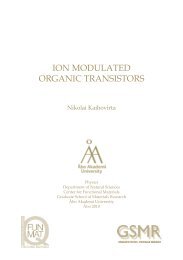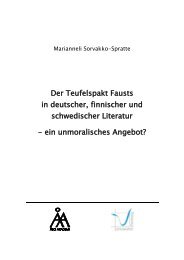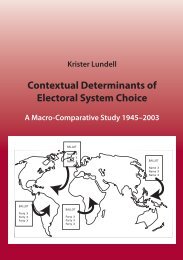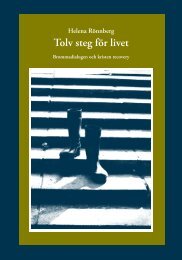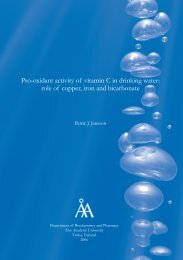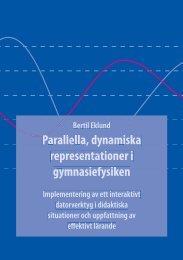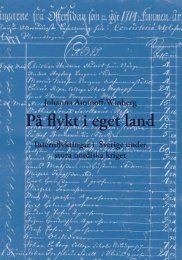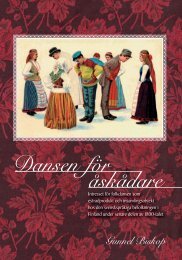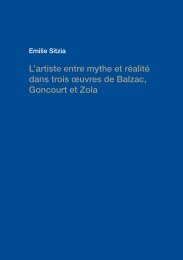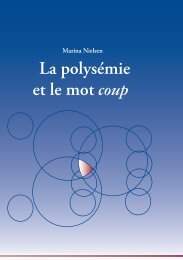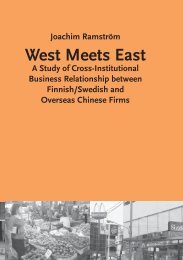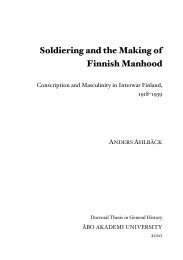102es eine interessante Parallele: Gott hat sein Gesetz in den zwei Tafelnoffenbart, aus denen die erste das Verhältnis des Menschen zu Gottbehandelt und die zweite das Verhältnis unter den Menschen. DieGrundprinzipien der zweiten Tafel kann der Mensch noch nach demSündenfall durch verdorbene Reste aus der Schöpfungsoffenbarungerkennen, wogegen eine natürliche, d.h. auf der Schöpfung beruhendeErkenntnis der ersten Tafel im Sündenfall völlig verlorengegangen ist. 214<strong>Calvin</strong> sieht viele Beweise dafür, dass es in der verdorbenen Seele nochGaben Gottes gibt. Er bezeichnet den verdorbenen Sinn “mit den GabenGottes bekleidet und geschmückt”. 215 Als Beweise gelten auch imMenschensinne innewohnende universale Abbildungen der Gesellschaftsordnung,216 antike <strong>Recht</strong>sgelehrte, die mit Billigkeit (aequitate) zivileOrdnung und Disziplin verbreitet haben, 217 menschliche Instinkte, die aufdie Erhaltung der Gemeinschaft zielen und die berichten, dass derMensch ein soziales Tier ist, 218 Wissenschaft, Kunst und Handwerker-214 Olsson 1943 fragt, inwieweit Gott aus dem Moralgesetz zu erkennen ist (248), undbemerkt, dass nach <strong>Calvin</strong> die Erkenntnis der ersten Tafel unmöglich, die der zweiten Tafelmöglich ist (267). — Schreiner 1991, 71: <strong>Calvin</strong> saw this common light manifest itself in theunredeemed mind in the universal drive to know, to create, and to develop laws andcivilization. The inherently active nature of the fallen human <strong>bei</strong>ng is clear from theforamtion of the arts, sciences, and the laws of the state.” — S. auch Haas 1997, 94. — Helm2004, 137 “Part of <strong>Calvin</strong>'s case for human accountability to God is that some knowledge andunderstanding of the right remains in fallen human nature, particularly knowledge of theLaw's Second Table. This gives <strong>Calvin</strong> the resources to develop a theory of agency that isdistinctively human, even though mankind is fallen and therefore, in a sense, not fully orproperly human.”215 "Quoties ergo in profanos scriptores incidimus illa, quae admirabilis in iis affulgetveritatis luce admoneamur, mentem hominis, quantumlibet ab integritate sua collapsam etperversam, eximiis tamen etiamnum Dei donis vestitam esse et exornatam." IIii15216 "Manet tamen illud, inspersum esse universis semen aliquod ordinis politici. Atquehoc amplum argumentum est, in huius vitae constitutione, nullum destitui luce rationishominem." IIii13 — Douglass 1985, 25 “The ability to engage in governing activity, politia, isone of the marks of humanity as opposed to lower animals, one of the aspects of the imageof God along with the reason and reverence for God or piety.”217 "Veritatem affulsisse antiquis iureconsultis negabimus, qui tanta aequitate civilemordinem et disciplinam prodiderunt?" IIii15 — Augustijn 1988, 133: <strong>Calvin</strong> weist auf “profaniscriptores” hin.218 "Quoniam homo animal est natura sociale, naturali quoque instinctu, ad fovendamconservandamque eam societatem propendet: ideoque civilis cuiusdam et honestatis etordinis umversales impressiones inesse omnium hominum animis conspicimus." IIii13
103kunst, die zum Vorschein bringen, dass es kaum jemanden gibt, der nichtirgendeine von Gott gegebene Fähigkeit hätte. 219Der Verstand ist eine natürliche Fähigkeit des Menschen, und somit ist erverdorben, aber nicht völlig verloren. 220 Einiges von ihm ist im Menschennoch als Funken übrig. Der Mensch liebt die Wahrheit von Natur aus undsucht nach ihr, obwohl ihm die Fähigkeit, Wahrheit zu erreichen, fehlt. 221Der Mensch will wissen, was das Seiende in seinem tiefsten Grund ist,und darum versucht er, die Wahrheiten der Vernunft aufzuklären. DerVerstand weiß aber nicht immer, wo Wahrheit zu suchen wäre, weil erirrend und unfähig ist. Aus der Sehnsucht nach der Wahrheit leitet <strong>Calvin</strong>ab, dass der Mensch schon im Voraus eine Ahnung davon hat, dass es dieWahrheit gibt, denn sonst wäre es nicht möglich, dass der Mensch nachder Wahrheit strebe. 222 Die Ahnung von der Wahrheit steht im Kontext219 “Sequuntur artes tum liberales, tum manuariae, quibus discendis, quia inestomnibus nobis quaedam aptitudo, in eis etiam apparet vis humani acuminis. Quanquamautem non sunt omnes omnibus discendis idonei, satis tamen communis energiae certumspecimen est, quod nemo prope reperitur cuius in arte aliqua perspicientia non se exerat.Neque sola suppetit ad discendum energia et facilitas, sed ad excogitandum in unaquaquearte novum aliquid, vel amplificandum et expoliendum quod alio praeeunte didiceris. ”IIii14; “Verum quidem est, dum terrae plus iusto affixi sunt homines, hebetari, imo, quia apatre luminum alienati sunt, tenebris esse obcaecatos, ut se a morte fore superstites noncogitent; interim tamen non ita in tenebris extincta lux est, quin immortalitatis suae sensutangantur. Certe conscientia, quae inter bonum et malum discernens, Dei iudicio respondet,indubium est immortalis spiritus signum.” Ixv2. — Laut Doumergue IV, 147–148 gibt es dreiBereiche des irdischen Lebens, in denen der Verstand nicht völlig verdorben ist: 1) Politikund gute Wirstschaft, 2) mechanisches Können und freie Künste, 3) Philosophie.220 Olsson 1943, 216.221 Augustijn 1988, 133–134: Die Wahrheit ist für <strong>Calvin</strong> immer eine Gabe Gottes, undder Geist Gottes wirkt auch in Ungläubigen.222 “Ergo, ut secundum primam illam distinctionem, qua hominis animam inintellectum et voluntatem partiti sumus, orationis ordo procedat: vim intellectus priore locoexcutiamus. Perpetuae caecitatis ita eum damnare, ut nihil intelligentiae ullo in genere rerumreliquum facias, non modo verbo Dei, sed sensus etiam communis experimento repugnat.Videmus enim insitum esse humano ingenio desiderium nescio quod indagandae veritatis,ad quam minime aspiraret nisi aliquo eius odore ante percepto. Est ergo iam haec nonnullahumani intellectus perspicientia, quod a veritatis amore naturaliter rapitur: cuius neglectusin brutis animantibus arguit crassum absque ratione sensum. Quanquam haec qualiscunqueappetentia, antequam cursus sui stadium ingrediatur, deficit: quia mox concidit invanitatem. Siquidem mens hominis, prae hebetudine, rectam veri investigandi viam tenere
- Seite 1:
Kalle ElonheimoDas Universale Recht
- Seite 4:
4.2.3. Von der Erkenntnis zur Aktio
- Seite 7 und 8:
31. EINLEITUNG“Porro haec ipsa qu
- Seite 9 und 10:
5Von Orléans wechselte der junge H
- Seite 11 und 12:
7Studien die Denkweise der Rechtswi
- Seite 13 und 14:
9selben Zeit erschien auch die erst
- Seite 15 und 16:
11bachtung wird dadurch bestätigt,
- Seite 17 und 18:
13zum Naturrecht zu rekonstruieren.
- Seite 19 und 20:
15Prinzipien, die dem Menschen inne
- Seite 21 und 22:
17Ebenso gibt er zu, dass Calvin si
- Seite 23 und 24:
19positiven, insbesondere staatlich
- Seite 25 und 26:
21und miteinander verglichen. Dabei
- Seite 27 und 28:
23Wie schon der Name des Werkes ver
- Seite 29:
25Kommentare und Predigten zu Mose-
- Seite 35 und 36:
31Seine weiteren Quellen hat Gratia
- Seite 37 und 38:
33Einrichtung kann zum Naturrecht i
- Seite 39 und 40:
35ist. 20 So sind in seinem Denken
- Seite 41 und 42:
37Der freie auf das Gute um des Gut
- Seite 43 und 44:
39unveränderlich, aber was die Hin
- Seite 45 und 46:
41Sinne ist: in Bezug zu Gott und i
- Seite 47 und 48:
43Naturrechtslehren, die einzelne R
- Seite 49 und 50:
45Dinge außerhalb Gottes betrachte
- Seite 51 und 52:
47Fragen, die man mit Hilfe der ant
- Seite 53 und 54:
49beschädigen, wenn man dem Naturr
- Seite 55 und 56: 51Menschen dazu bringt, dass er dem
- Seite 57 und 58: 53Erkenntnisse teilt er noch in zwe
- Seite 59 und 60: 55Der schöpfende Gott ist der drei
- Seite 61 und 62: 57glauben. Wer nicht glaubt, denkt,
- Seite 63 und 64: 59vollen Wirken ist Gott eine absol
- Seite 65 und 66: 61ordo naturae, kann aber auch bede
- Seite 67 und 68: 63erstreckt. 50 Er begründet sein
- Seite 69 und 70: 65schriften über sexuelle Sittlich
- Seite 71 und 72: 67In einer tieferen Bedeutung zeigt
- Seite 73 und 74: 69Doppelgebot der Liebe bringt die
- Seite 75 und 76: 71Katechismus vom Jahre 1537 hat Ca
- Seite 77 und 78: 733.2.5. Fokussiertes GesetzGott ha
- Seite 79 und 80: 75Die Rechtsvorschriften des Alten
- Seite 81 und 82: 77- potentia ordinata Dei: ob Gott
- Seite 83 und 84: 79v. Chr.) nennt. 127 Die Aufkläru
- Seite 85 und 86: 81Zeremoniegesetz, dessen Gültigke
- Seite 87 und 88: 83Wenn es um die Folgen des Sünden
- Seite 89 und 90: 85vieler Völker besser ist, ein st
- Seite 91 und 92: 87erhaltenen Fähigkeiten sind dem
- Seite 93 und 94: 894.1.2. Dualistisches Menschenbild
- Seite 95 und 96: 91Seele ist unsterblich 160 und der
- Seite 97 und 98: 93wenn er über “unsterblichen Ge
- Seite 99 und 100: 95Menschen zur Erfüllung der irdis
- Seite 101 und 102: 97aber die Einteilung in zwei Teile
- Seite 103 und 104: 99dem Bild Gottes und der Vernunft
- Seite 105: 101Bild, in dem zwei Welten mit je
- Seite 109 und 110: 105Oben haben wir schon festgestell
- Seite 111 und 112: 1074.2.2. Der WilleDie andere Fähi
- Seite 113 und 114: 109leitende Königin für den Wille
- Seite 115 und 116: 111Wirken hat, aber auch diese Frei
- Seite 117 und 118: 113Begriffsgeschichte anhand der Li
- Seite 119 und 120: 115In das mittelalterliche Denken k
- Seite 121 und 122: 117nicht unter das Gewissen (syneid
- Seite 123 und 124: 119ein Empfinden über das Urteil G
- Seite 125 und 126: 121seinen Sitz im Menschen und wirk
- Seite 127 und 128: 123Obwohl das Gewissen für Calvin
- Seite 129 und 130: 125nehmen, aber anderseits kann er
- Seite 131 und 132: 127verdorben, nicht kann. 289 Der V
- Seite 133 und 134: 129Gerechtigkeit des Gesetzes in ih
- Seite 135 und 136: 131stellungen billigen und mit Belo
- Seite 137 und 138: 133Im Lichte jener Predigt scheint
- Seite 139 und 140: 1355. WIRKSAMKEIT DES UNIVERSALEN R
- Seite 141 und 142: 137bedeutet, dass der Mensch sie au
- Seite 143 und 144: 139Nicht-Gläubige können moralisc
- Seite 145 und 146: 141gemeinschaftliche Gebrauch des G
- Seite 147 und 148: 143zusammen betrachte, komme ich zu
- Seite 149 und 150: 145der vollständigen Einhaltung de
- Seite 151 und 152: 147geholfen wird. 41 Die Menschlich
- Seite 153 und 154: 149Fluch und den Tod. Nach Calvin i
- Seite 155 und 156: 151der negativen Form und in der In
- Seite 157 und 158:
153untergeordnete Stellung als Ausd
- Seite 159 und 160:
155alterliche weltliche als auch ka
- Seite 161 und 162:
157versuche ich, die Stellung des N
- Seite 163 und 164:
159stück oder Gebäude und hält e
- Seite 165 und 166:
161denken viele, dass sie frei und
- Seite 167 und 168:
163Wenn Calvin, anders als es im Ch
- Seite 169 und 170:
165keitsbild von ihm: in der Lehre
- Seite 171 und 172:
167Die Richtschnur für Gesetze bes
- Seite 173 und 174:
169Calvin schließt sich der Tradit
- Seite 175 und 176:
171Das Gesetz hat im Denken Calvins
- Seite 177 und 178:
173gerechnet. Obwohl die ganze Natu
- Seite 179 und 180:
175Entscheidung entzogen werden, we
- Seite 181 und 182:
177Gewissen vor allem ein geistlich
- Seite 183 und 184:
179Lage eines Menschen aus zu sagen
- Seite 185 und 186:
181Zinsnahmeverboten verpflichten n
- Seite 187 und 188:
1837. QUELLEN, LITERATUR UND ANHANG
- Seite 189 und 190:
185CCCM Corpus Christianorum, Conti
- Seite 191 und 192:
1871963 L'homme et la femme dans la
- Seite 193 und 194:
189VJean Calvin. Les hommes et les
- Seite 195 und 196:
191Lane, A.N.S.1981 Calvin's Use of
- Seite 197 und 198:
193Exiztenz heute, N.F. 152. Münch
- Seite 199 und 200:
195Positionen. Opladen.Veijola, Tim
- Seite 201 und 202:
197Aristoteles . . . . . . . . . .
- Seite 203 und 204:
1997.5. Anhang: Calvins Gliederung
- Seite 205 und 206:
201Lev 19:17 / Lev 19:18 / Lev 19:1
- Seite 207:
"Porro haec ipsa quae ex duabus tab



